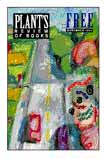

In her popular novel The Thorn Birds, Colleen McCullough gave readers a romantic escape into the past from present reality. But her later work, A Creed for the Third Millennium slaps the reader across the face with a grim future reality. In this book she takes us to the world of the mid-21st century where our descendants are paying the price of our extravagances today.
It's a world where family size is strictly regulated due to over-population. It's a world where annual migrations toward the equator are mandatory as the polar icecaps slowly encroach on the land that is left. It's a world where air and car transportation are only available on a priority basis, and--no surprise--to those with important government jobs. And, it's a world where mental depression runs rampant as people long for the way things used to be.
But the government cares about the people and their lives in these United States. The president orders a government agency to find a cure for "millennial depression". A search is undertaken to find a person who can distract the general populace from their lives of quiet desperation. The computer finds Dr. Joshua Christian, a psychologist who believes the cure lies in faith, hope and love (traditional family values?).
The president intends to help the many through the regretable, but unavoidable, sacrifice of the few. But the morality of the government's intentions are called into question by the secrecy and behind-the-scenes machinations that are involved in implementing the plan.
Dr. Christian is never told of his selection by computer as the best prospect to solve the country's problem. He is blessed (or cursed) with charisma, and this intangible asset leads the computer to select him over other candidates. However, his life and the lives of his family are changed forever without their knowledge or acquiescence.
Thus the question: Even though Christian's philosophy and charisma helped to lift millions of people from despair to hope, was it right to ruin the lives of individuals without their knowledge and consent? The "greater good" is purchased at a great price, unknowingly paid by a few. This exploration of "relative morality" is the core of the book.
The story is set in the scary future--scary because it is not a future beyond the reader's imagination. This book could potentially spark a rigorous philosophical debate..



 Return to Facing
Return to Facing